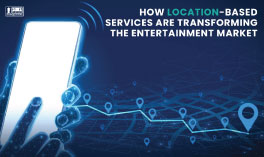
The global Location-Based Services (LBS) market, which was valued at USD 24.00 billion in 2023, is anticipated to reach USD 123.83 billion by 2032, with an exceptional CAGR of 20.00% during the forecast period 2023 – 2032. This explosive growth is a testament to the growing dependence on geographic data for creating customized, interactive, and immersive entertainment experiences. Location-based services, or LBS, aren’t only becoming the new navigation system — they’re also changing how consumers experience entertainment content, live events, and marketing campaigns.
Now let’s take an even closer look at how location-based service (LBS) is bringing about a revolution in the entertainment sector along with its potential to transform and challenges.
This is how LBS technology is ushering in the era of mobile personalized entertainment. Entertainment companies are starting to adopt content creation models because entertainment provides a wealth of user location data. Streaming services including Spotify leverage geographic data to create playlists based on where a listener is located or has traveled. In a similar way, apps that provide an augmented reality (AR) session such as Pokémon GO engage users to allow them to explore their physical environment as the gameplay combines dynamic real-world movements with virtual scenes.
The success of AR in the entertainment industry lies in its potential to integrate digital content with the physical world, offering a new level of immersion and engagement that traditional media could not achieve.
Revolutionizing Live Events
LBS has changed the nature of audiences' experience of concerts, sports, and festivals. Event planners are increasingly turning to interactive maps that allow people to navigate large venues or find nearby amenities or attractions. For instance, at music festivals, LBS-based notifications inform attendees about forthcoming performances or promotional offers available in the event space.
Geofencing Technology is also used to create exclusive content or offers to event-goers within a specific radius. Sports arenas have started to experiment with augmented reality applications with the aim of improving fan engagement, such as putting stats or player profiles on live-action views. Such innovations allow the live event experience to be more immersive and personalized as they respond to the needs of the audience during the live event.
Innovative Marketing Strategies
Location-based marketing is a no-go area for the entertainment industry. Companies can send tailored advertisements and promotions by identifying users based on their physical location. For instance, if a user walks into a cinema complex, the user might get push notifications related to the next movie screenings or discounts on choicest snacks.
In the gaming sector, this means launching hyper-targeted campaigns, promoting region-specific challenges or tournaments, for instance. Such targeting not only increases consumer interaction but also drives foot traffic and conversion at real-word entertainment locations.
Location-Based Services are giving a long-needed facelift to amusement parks and other entertainment attractions. LBS-enabled mobile apps now navigate visitors through sprawling parks, directing them to rides, restaurants, and restrooms. Disney World, for instance, has integrated sophisticated LBS functions to provide personalized welcomes from characters or mobile scavenger hunts that help you explore the parks.
These are not just convenient, these innovations enable a richer, more immersive visitor experience. Using applications enabled by the LBS system, virtual queues help show control over wait time and allow guests to spend more time on attractions and less on queues.
LBS has led to significant advancement in the gaming world, especially esports. Geolocation local tournaments is a boost for gaming companies' identification of gamers based on their specific geographic area; gamers get a sense of community during competitive play. Also, mixed-reality gaming experiences, which overlay real-world locations with digital elements, have also become popular, adding to the immersive nature of gaming in the modern era.
This has resulted not only in drawing gamers but also in yielding various opportunities for brands to engage younger, tech-savvy audiences in new and innovative ways.
LBS Technology also delivers valuable analytics that businesses can use to optimize their strategies and offerings. For example, foot traffic analysis enables organizers to understand the most popular sections of the event, guiding them in layout planning and resource allocation. Geographic data analysis provides valuable insights into consumer preferences that lead to enhanced, localized content curation in accordance with individual audiences.
It allows businesses to improve their services by providing immediate customer satisfaction feedback through real-time feedback mechanisms like location-based surveys.
Although LBS has great potential, it is facing obstacles that the entertainment industry must overcome. The chief among them are privacy concerns. The introduction of strict regulations such as GDPR means that companies must ensure user information is collected and stored securely. Tech problems, including battery drain from apps that use a lot of GPS and constant internet access, can present obstacles as well.
Nevertheless, the developments in 5G technology, artificial intelligence, and the Internet of Things (IoT) are likely to eliminate these problems, leading to more advanced applications of LBS in the future.
Location-based services are revolutionizing the entertainment market, driving personalized content delivery, immersive live events, and highly targeted marketing. As the market grows to an estimated USD 123.83 billion by 2032, its impact will only deepen, reshaping consumer expectations and industry standards. By embracing LBS, businesses can unlock unprecedented opportunities for engagement, innovation, and growth, solidifying their place in the entertainment ecosystem.
Stay tuned to SNS Insider for more insights into the transformative trends shaping the global entertainment industry!
Hi! Click one of our member below to chat on Phone